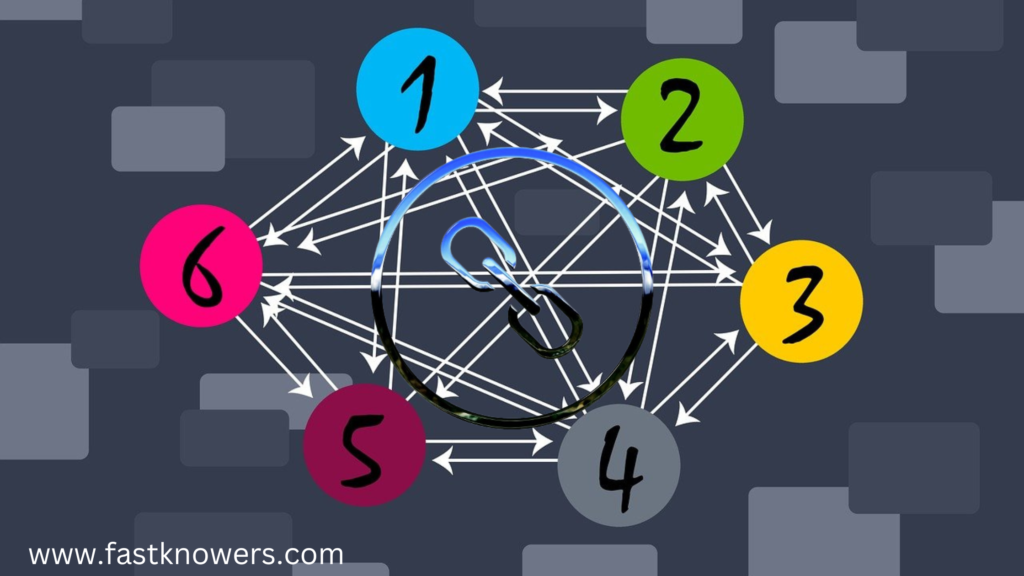Running a blog is not just about creating articles but driving traffic and establishing authority in your niche. In this guide, I will discuss with you key types of links every blogger should strive to get and why getting them is important for blog’s growth and also tips on how to get them.
One of the most effective ways to improve your blog’s visibility and ranking in search engines is by acquiring different types of high-quality links. Links do not only enhance SEO but also help you grow your blog’s reputation and reach. You may see our expert step-by-step guide on how to add a Nofollow tag to an external link.
Now, let’s start.

Top types of links that every blogger should strive to get
1. Backlinks (Inbound Links)
Backlinks (also known as inbound links) are links from other websites that point to your blog. They are considered to be the most important type of links because they serve as a vote of confidence for your content.
Search engines (Google, Bing, Yahoo, Yandex, etc.) view backlinks as a signal that your blog is credible, authoritative, and worth ranking higher in search results.
How to get backlinks
- Guest blogging: If you want to get backlinks, what you have to do first is to write guest posts for blogs in your niche.
- Create link-worthy content: Then you have to publish comprehensive guides, case studies, or original research that others will want to reference and link back to on your blog.
- Outreach: Even though you have done the methods above, you may also need to contact bloggers to link back to your article from their blog’s article.
Regardless the niche of your blog, striving to get backlinks supposed to be your major priority because they boost your blog’s domain authority and can drive significant referral traffic from the linking site. You may see our guide on how to check a domain authority score.
2. Internal links
Internal links are links that point to other pages on the same blog. They play a very important role in enhancing a blog’s SEO by helping search engines crawl a site and establishing content relevance. Internal links also improve user experience by guiding readers to additional valuable articles.
A proper usage of internal linking helps you to distribute link equity across your site, supports better ranking for older posts, and increases the time readers spend on your blog while leading to improved SEO and user engagement.
How to use internal links
- Link to older blog posts within new articles to keep them relevant.
- Ensure your most important content (also known as pillar content) has the highest number of internal links.
- When interlinking, ensure to use descriptive anchor text that includes relevant keywords. You may see our guide on top HTML codes every new blogger needs to know.
3. External links
External links (also known as outbound links) are links from your blog to other blogs. Although these links do not directly improve your rankings, they show search engines that your content is well-researched and connected to authoritative sources.
If you want to establish relationships with other bloggers, outbound links help you do that. Before you reach out to other blogger to help you get a backling from their blog, first of all you have to give them external links from your blog.
How to use external links
- Use external links when they are relevant in your blog post.
- Use it to reference authority sites in your niche.
- Do not link to low-quality and unrelated article because it decreases your trustworthiness.
Note that a properly implemented external links in your blog’s articles enhance the trustworthiness which inadvertently signas to both search engines and readers that you carry out a lot of researches before teaching them. You may see our expert step-by-step guide on tips on how to make a Google-friendly blog.
4. DoFollow links
A DoFollow link passes “link juice” or SEO value from one site to another. If you strive to get backlinks, aim to for DoFollow links as they are beneficial for SEO. When another blogger links to your blog with a DoFollow link, it shows to search engines that your content is valuable.
DoFollow links help to increase domain authority and ranking in search engines. The more high-quality DoFollow links you have, the better your blog.
How to get DoFollow links
- Write guest posts for blogger in your niche.
- Build relationships with bloggers and ask for links to be DoFollow.
- Write resource-rich content that bloggers will naturally want to reference and link to.
5. NoFollow links
NoFollow links are opposite of DoFollow links. They have a tag that tells search engines not to pass on any SEO value or “link juice.” While they don’t directly impact your SEO, they can still be valuable for driving traffic and page views.
How to get NoFollow links
- Engage with social media, blog comments, and forums where NoFollow links are common.
- Secure links from press releases or sponsored posts (note that such links are tagged NoFollow).
- Submit your content to directories and aggregators that offer NoFollow links.
Even though NoFollow links don’t directly boost SEO, they can bring traffic from other platforms, create brand awareness, and may eventually lead to DoFollow links if the right people discover your content. You may see our expert step-by-step guide on how to add a Nofollow tag to an external link.
6. Guest post links
Guest posting is one of the most effective ways to get backlinks, build relationships, and increase your blog’s reach. A guest post link refers to a link that you include within the content you write for another blog.
By now, I hope you have known that it is good to give first before you expect to collect. Before you can get any of the types of links we are discussing in this article, first of all, strive to take your time and write guest posts for a blogger in your niche. You may see our guide on how to write your first blog post on WordPress.
How to secure guest post links
- Fine top blogs in your niche and reach out to them that you want to offer them guest posts (we receive messages like this everytime).
- Ensure the guest post provides value to the audiences of blog you are writing for and include a link to your blog.
- Include links naturally within the content (don’t force yourself to add links).
Guest posting helps you build your reputation, reach new audiences, and acquire high-quality backlinks from established blogs. This not only improves your SEO but also positions you as an authority in your field. If our blog is one of the right ones for your guest post, please don’t hesitate to reach out through our contact page.
7. Resource page links
Resource pages are dedicated pages on a website that link out to useful content around a particular topic. Securing a link from a resource page can be highly beneficial, as these pages are often regarded as trustworthy by both users and search engines.
How to get resource page links
- Create valuable, evergreen content that other sites will want to include in their resource pages.
- Research niche-specific resource pages and reach out to the site owners to suggest your content.
- Provide a compelling reason for your content to be added, such as its depth, accuracy, or timeliness.
Getting links from resource pages can result in strong SEO benefits due to their quality and relevancy. They also help generate consistent traffic over time. You may see our expert step-by-step guide on top best tools to check blog traffic.
8. Editorial links
Editorial links are organic links that other bloggers give you without you having to ask for them. These links are highly valuable because they indicate that other sites find your content valuable and trustworthy.
How to earn editorial links
- Produce high-quality, in-depth, and shareable content.
- Become a thought leader by offering expert opinions, unique data, or compelling insights.
- Engage with media outlets or journalists who may reference your work in their stories.
It is good to strive to get this type of link. But don’t expect to get it when your blog is new. You have to work hard to get backilinks and make your blog authoritative in to naturally get editorial links. They will contribute to your SEO strategy because they will be DoFollow.
9. Image links
An often overlooked link-building strategy is image links. Do you know that when other blogger use your images on their blog, you will get a backlink to your blog as the source? If you don’t know, hope you have known it now.
If you want to get image links, then focus on creating your personal infographics and photos so that bloggers may find it appealing to download and use in their blog’s articles.
How to get image links
- Create a copyright-free personal images or infographics and disclose that blogger can use and link back to your blog.
- Submit your images to image-sharing sites.
- Reach out to bloggers or websites using your images without attribution and ask for a link.
Image links diversify your backlink profile and bring additional traffic especially on websites where images are a primary form of engagement.
Conclusion
Hope this article has helped you understand the types of links that every blogger should strive to get in order to improve their SEO, boost their traffic, and establish their blog as an authority in their niche. Please let me know in the comment box below the type of link (backlinks, internal links, or even image links) that you going to focu on.
If you know that this article has shown you different types of links that every blogger should strive to get, then subscribe to my YouTube channel for more updates on web design and digital marketing. You may also see our step-by-step guide on how to eliminate 404 errors from your blog.






If I drop my website link in a popular forum platform, what type of link (nofollow or dofollow) will I get? Does it increase seo?
Hi dear Haniyetu. Please know that links that are placed in a forum platform always have a nofollow tag. They would not increase SEO but they increase page views.
Certainly, I like your blog and articles you create. How do you take to do all these? Please let me know; do you have assistants that help you? Because I want to start this business.
Sir which type of link do link in comments sections carry? Example, if I enter my website link in this comment in order to get backlink, which type of link is it; dofollow or nofollow?
Hi dear Sudan, links in the comment section carry a nofollow tag.
Dofollow backlinks are good for blog SEO. Thank you so much for your teaching in this post. Now, I will be seeking to get backlinks from bloggers in order for my blog to rank higher organically.
This guide is truly a high-quality and step-by-step one. I enjoyed every section in it.